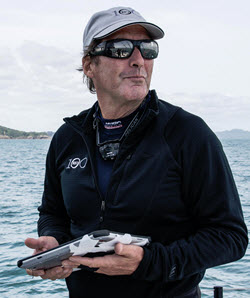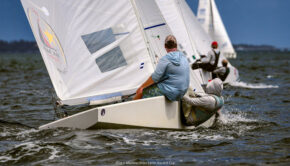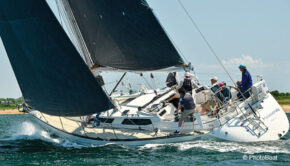Harnessing the Information Age
Published on January 7th, 2016
There is a long history of advancements in the grand prix section of the sport that trickle down to the recreational sailor. Some of these have aided everyone, while others have given the advancement to those with the resources.
We asked 2-time America’s Cup winning navigator Peter Isler, who is leading a series of webinars in the use of the tactical and navigation software Expedition, if having this advanced technology on board is helping or hurting our sport?
 I come from a one design background, and even today most small boat classes do not permit instruments and other technology to be used while racing. Instead of having target boat speed provided – and programs that tell you how much longer you have to go to the layline – you have to sail by feel to maximize performance.
I come from a one design background, and even today most small boat classes do not permit instruments and other technology to be used while racing. Instead of having target boat speed provided – and programs that tell you how much longer you have to go to the layline – you have to sail by feel to maximize performance.
It takes real skill to look at the sails and the waves ahead of you to stay in the groove, and also peering over your shoulder to accurately call the layline. There’s nothing wrong with sailing this way – and in fact – a lot of big boat sailors who are surrounded by the latest instruments would benefit from turning everything off and sailing by feel instead.
“Digitalisis” can be a dangerous thing.
That said – on the boats where there are electronic instruments allowed – the addition of tactical and navigation software like Expedition can also have either beneficial or deleterious effect on performance.
Used optimally, the information available from the programs can be used to help the sailors make better decisions (still the human being should call the tack to the layline – not the computer). And that’s a good thing.
But just like a hoisting a new sail, having new technology on board doesn’t mean you will sail any better – you have to learn how to use it. With the plethora of information that becomes available from the software – the real challenge is learning how and when to use it – to filter it so it helps your sailing.
When competing in anger, the last thing you want to be is like the person at the dinner table whose eyes are glued to the screen of their iphone. The best navigators/tacticians/sailors who use strategic software have learned how to filter the information so they can keep their heads “out of the boat” and not glued to the deck screen.
Is the use of onboard computers helping our sport grow? Are instruments better for sailing? Should we be using a sextant to navigate rather than a GPS? The answer is moot – for bigger boats that already use sailing instruments – that ‘train left the station’ a long time ago.
I now see lots of folks using apps on their smart phones to navigate or even track performance. Well those folks would greatly increase the accuracy, power and amount of information available if they used the power of a full computer running proper racing/navigation software that is plugged into a well-tuned instrument system.
Is it expensive? You decide. For the cost of a low-end laptop – a wifi router, a tablet, and some software – anybody can jump into the game and start learning about a whole new world of information and tools. And in this day and age, you don’t need to go to the university computer lab to find someone who is adept enough with technology to figure all this out and soon be providing valuable information to the sailors on the boat – so that they sail faster, safer and smarter.
Does it help? It depends, as any new toy on the boat can be a distraction and take the team away from sailing the boat and looking for the wind on the water. But in the end, once you learn how to fit its information to you and your team’s needs, it can really be a game changer and open up a whole new world of information and “fun”.









 We’ll keep your information safe.
We’ll keep your information safe.